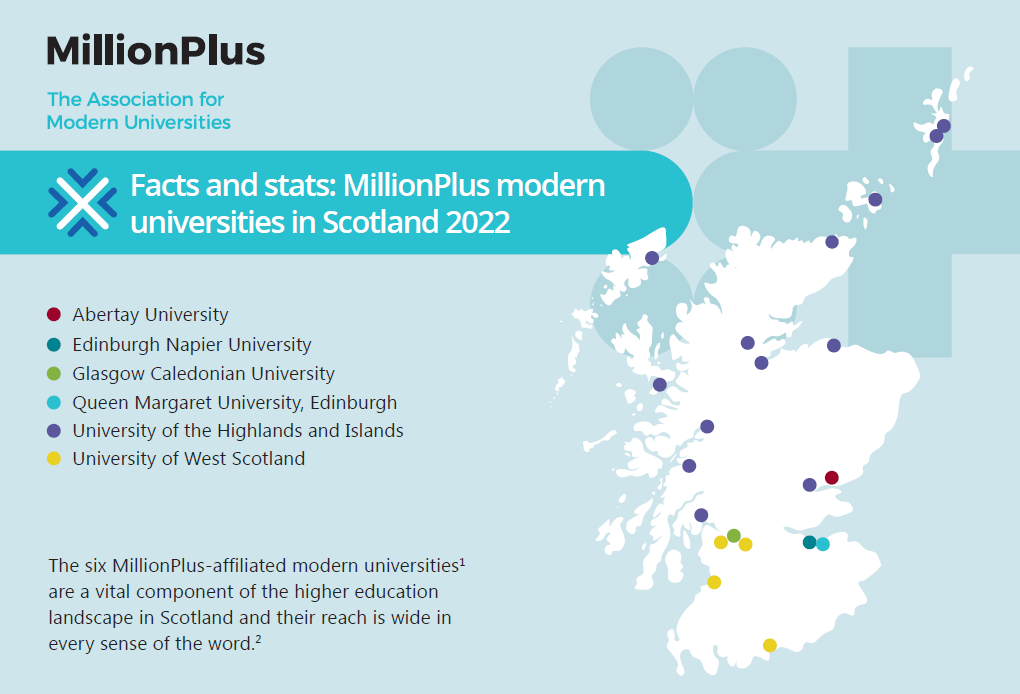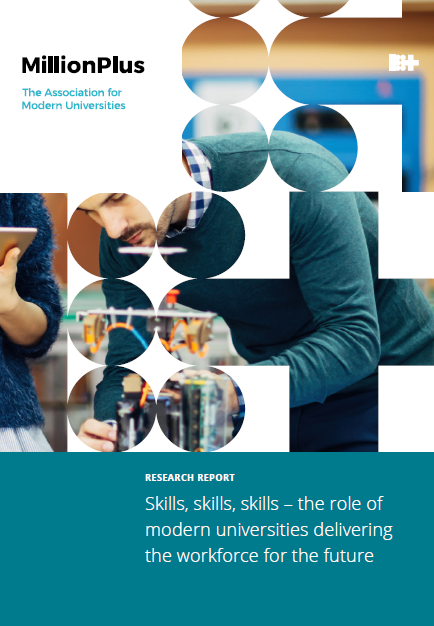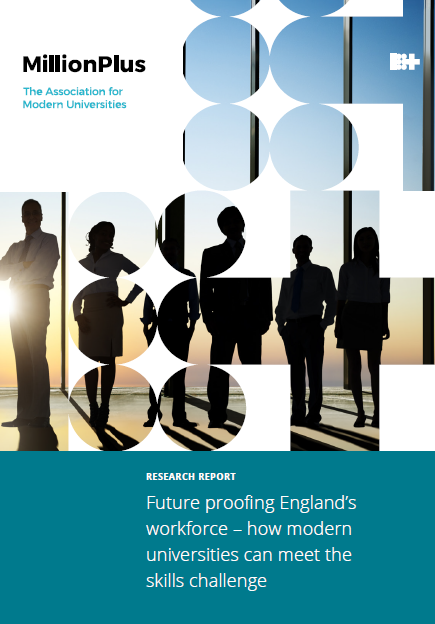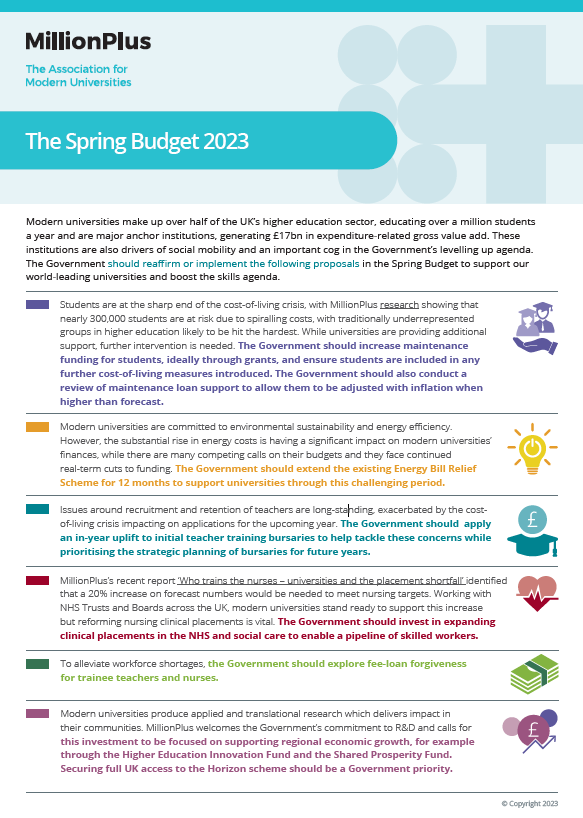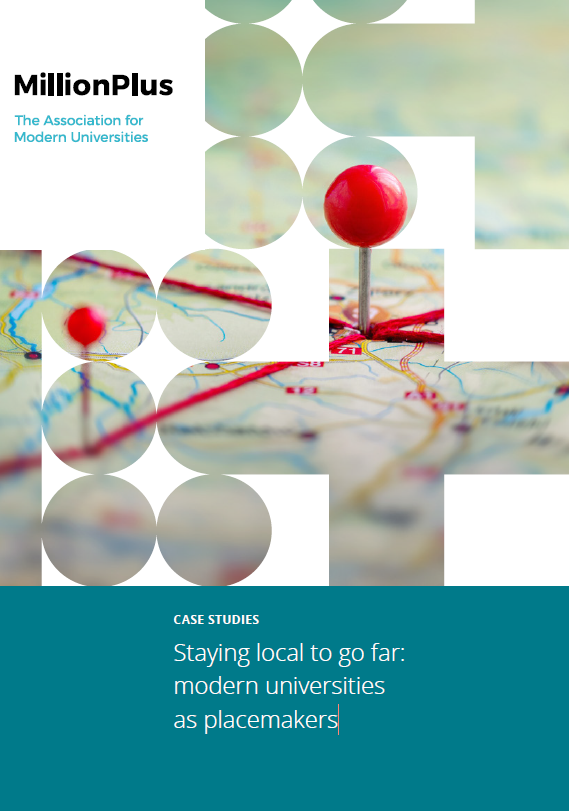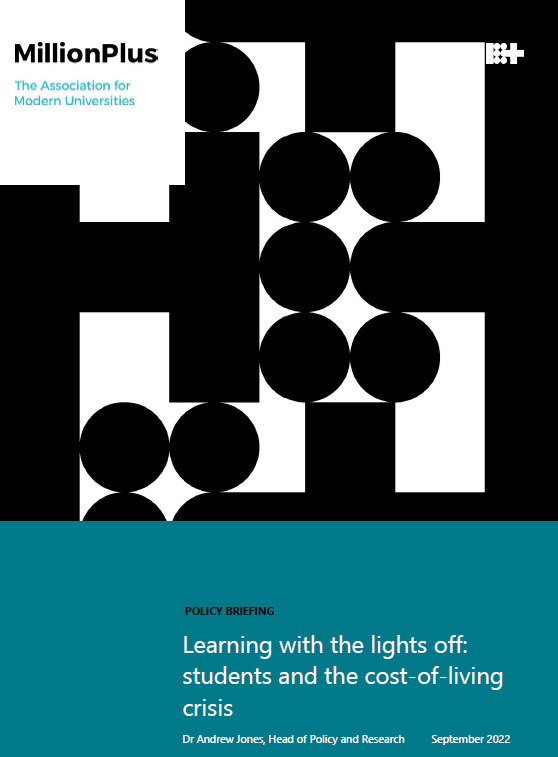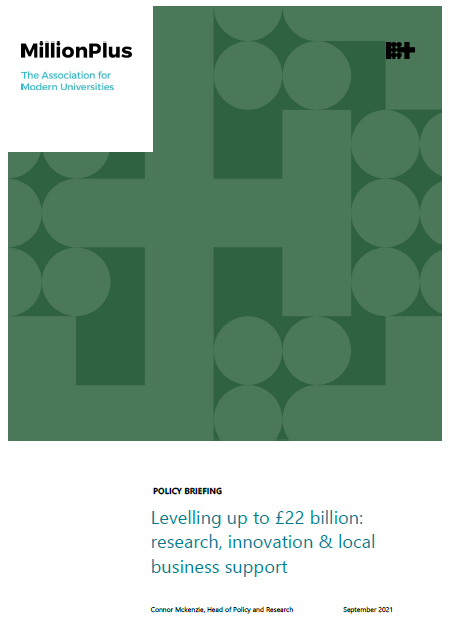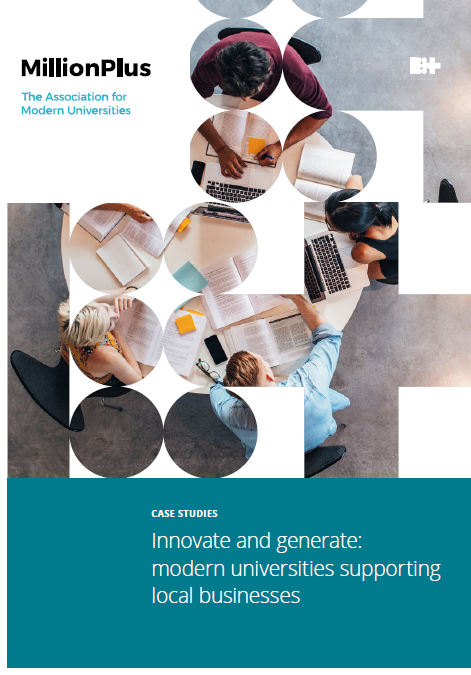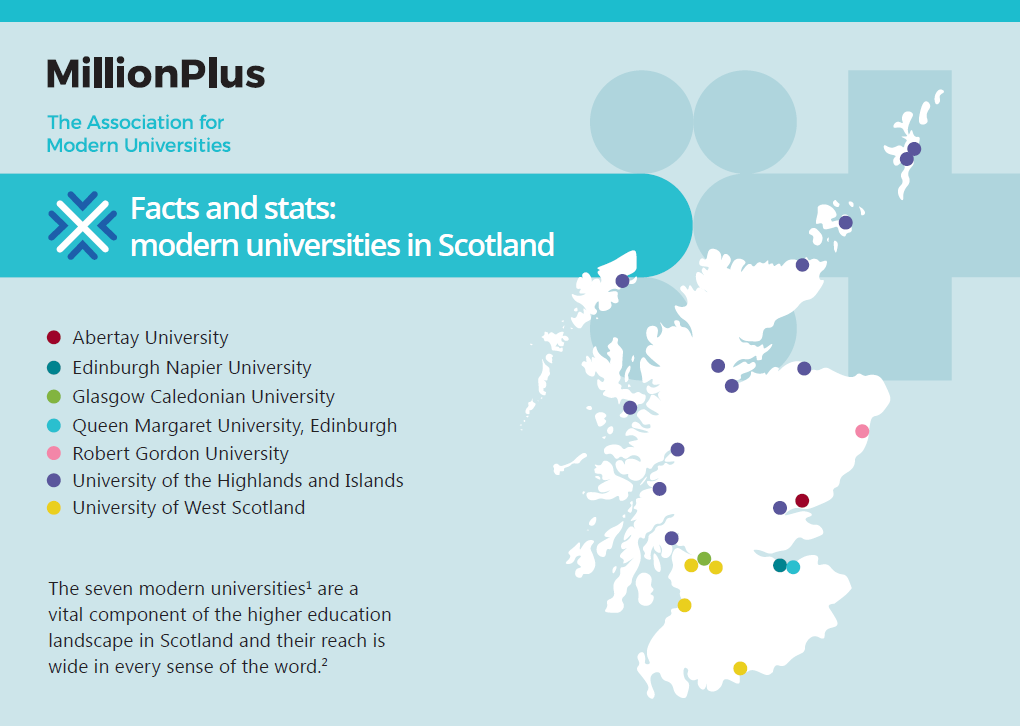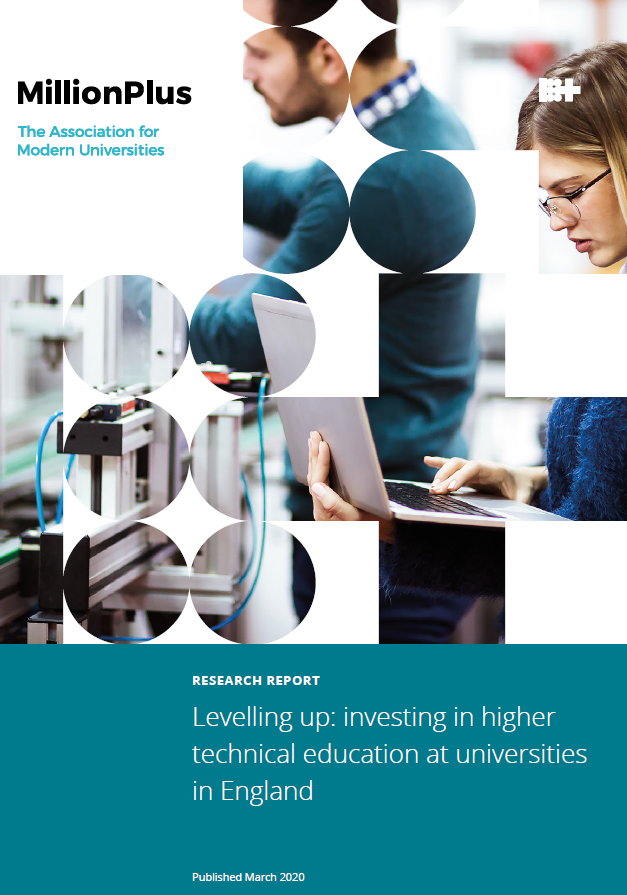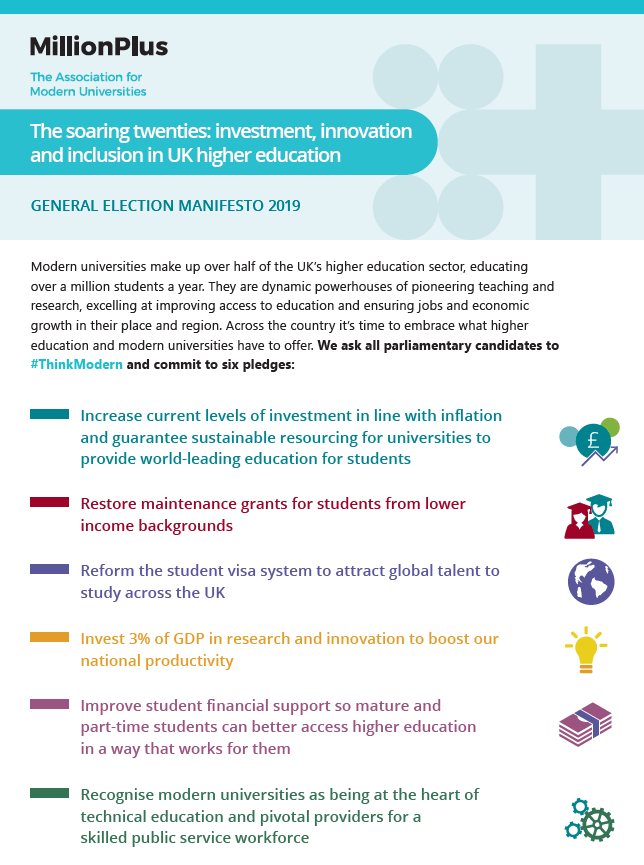Publications (All)

Type
Theme
Year



Response
16 May 2024
Approach to OfS public grant funding
The OfS initiated a call for evidence as it is considers how it should use funding made available to it by the Government to benefit students, taxpayers and the higher education sector.
It sought views about how the organisation could develop its funding approach in three broad areas:the activities it funds; how funding allocations are determined; and the factors that should be prioritised in decision making.








Parliamentary Briefing
18 Apr 2023
Westminster Hall - Research and development funding and Horizon Europe


Response
24 Mar 2023
Scottish Government consultation on post school education purpose and principles


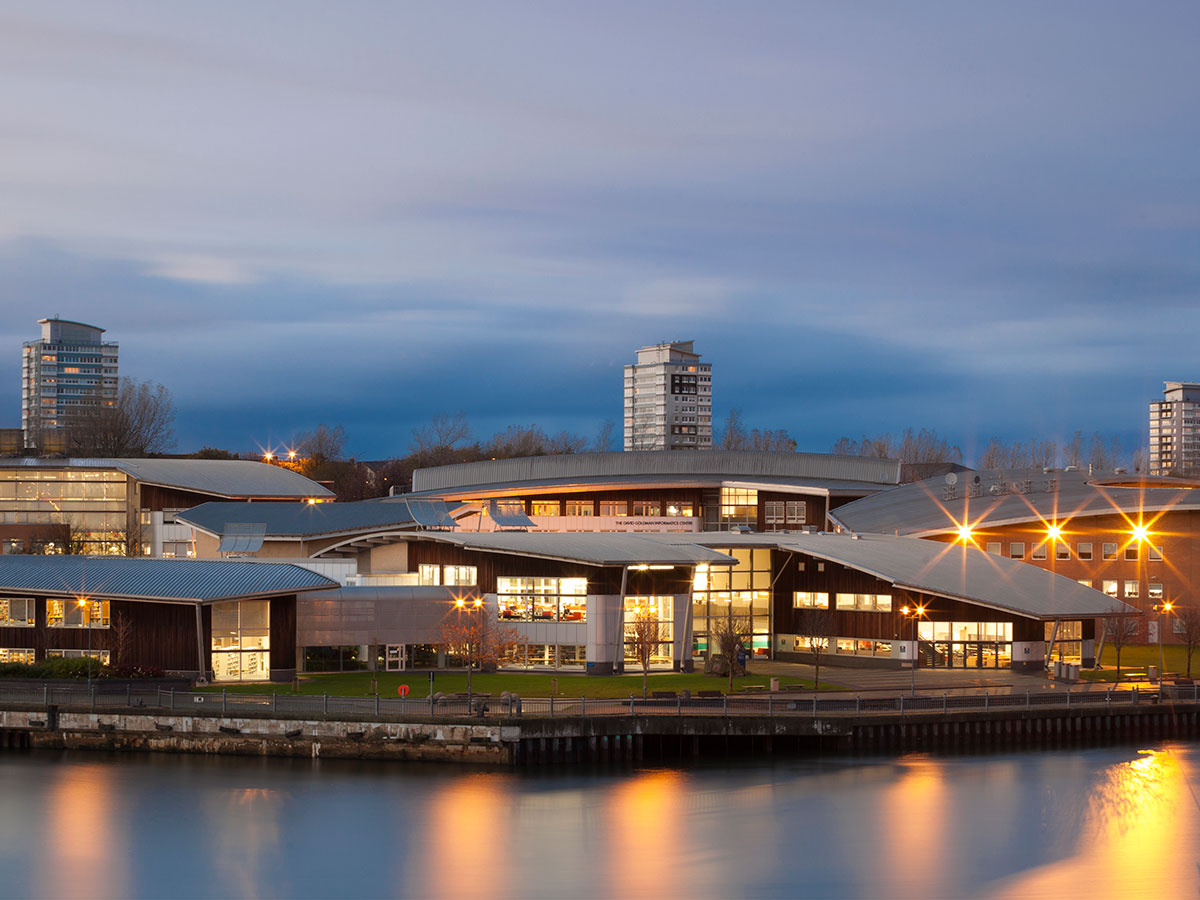
Case study
01 Mar 2023
University of Sunderland: tackling capacity issues in the north east
To increase capacity in the north east, Health Education England has employed a strategic lead for enabling effective learning environments across the north east and north Cumbria and is working with Trusts to explore new placement areas.
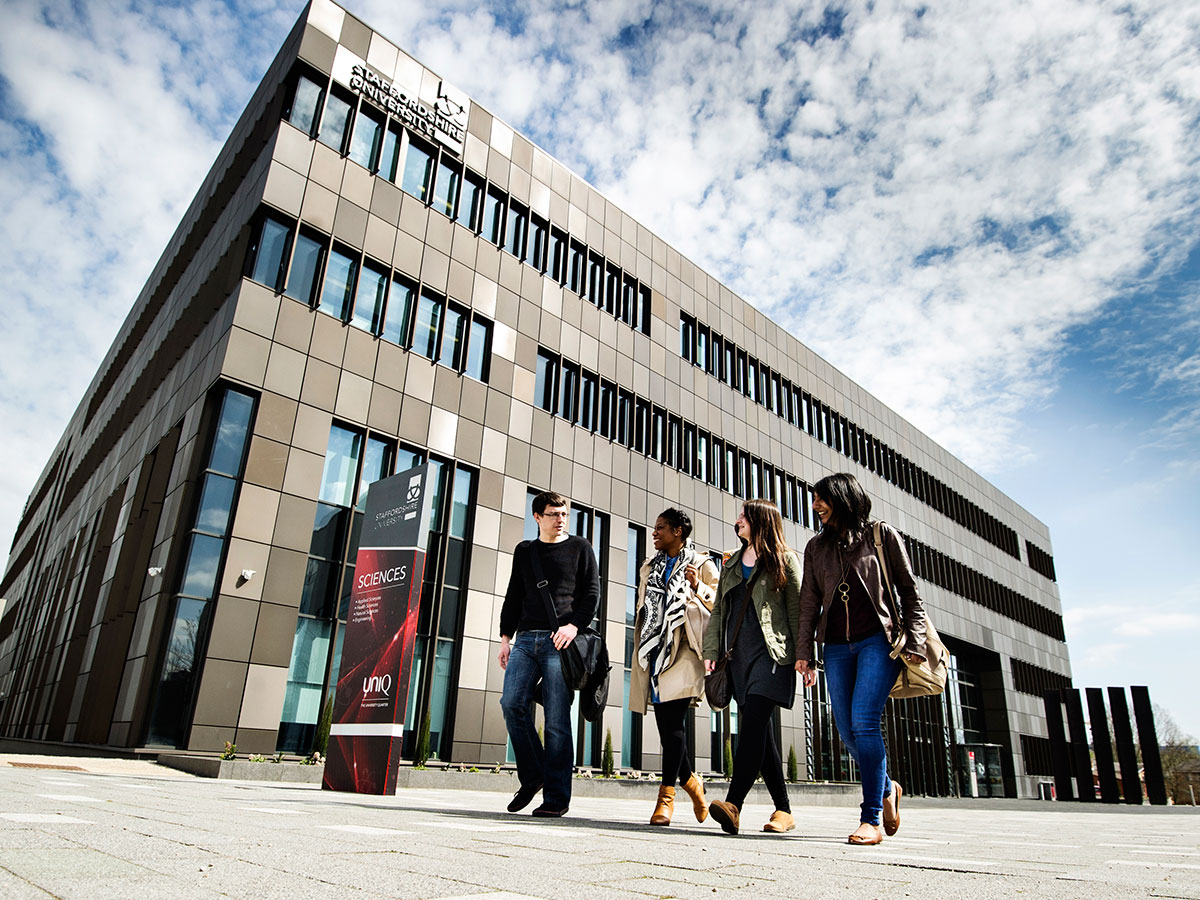
Case study
27 Feb 2023
Staffordshire University: using HEE funding to set up and deliver virtual nursing placements
Staffordshire University has used funding from Health Education England (HEE) and elsewhere to support the set up and delivery of simulated (virtual) placements.
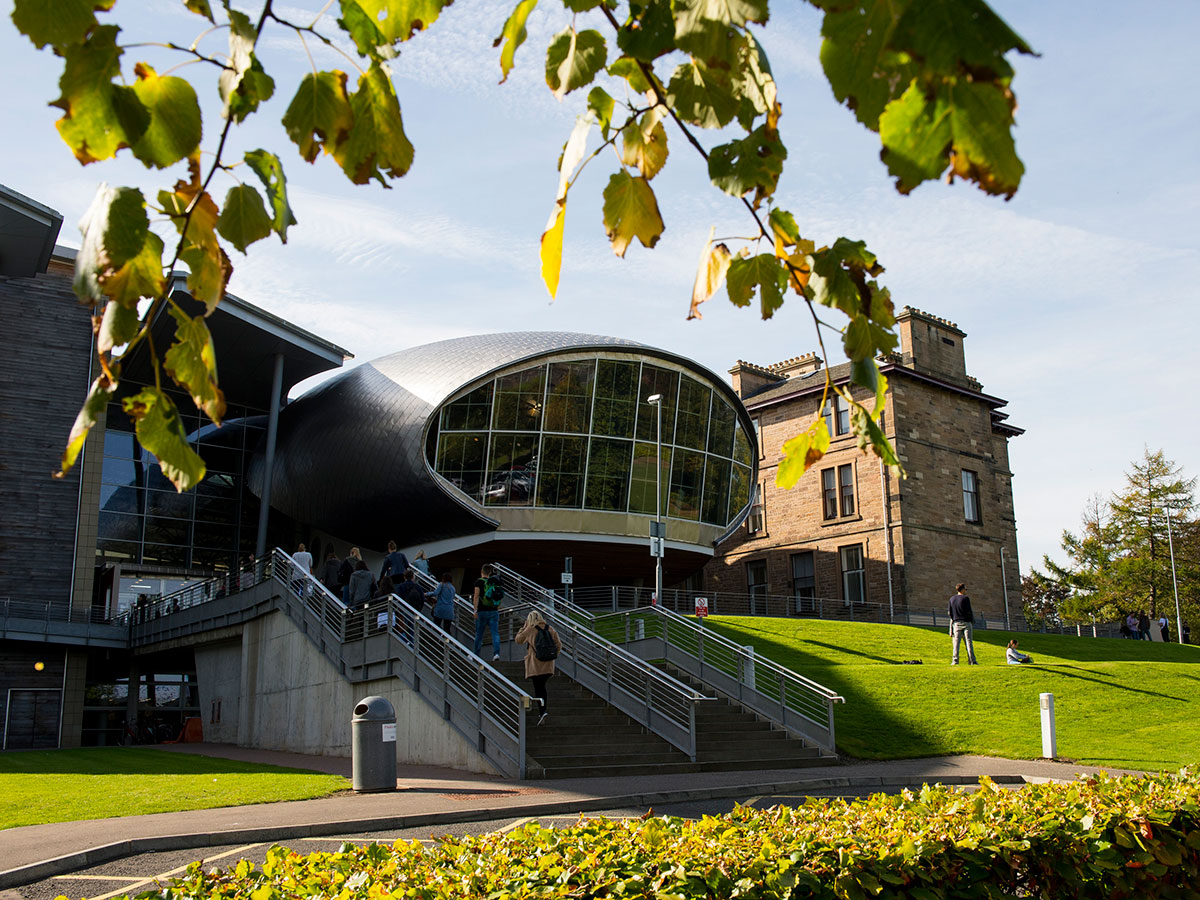
Case study
27 Feb 2023
Edinburgh Napier: reducing demand on placement capacity through simulation
Edinburgh Napier University has worked with placement partners to deliver the maximum amount of simulation hours offered by the Nursing and Midwifery Council through the innovative use of simulation technology. This has reduced the demand on placement capacity – a key challenge - by 20-30%.

Case study
24 Feb 2023
The University of Cumbria’s mission is to transform lives and livelihoods, now and for future generations, and to work with partners to address the demand for and support the delivery of higher-level nursing skills to England’s north west region and beyond.

Case study
24 Feb 2023
Virtual Practice Learning at Canterbury Christ Church University
Canterbury Christ Church University developed Virtual Practice Learning (VPL) in response to placement restrictions during the pandemic. VPL is accessed remotely by students and consists of weekly experiences focused on aspects of health and social care identified within the NHS Long Term Plan.

Case study
23 Feb 2023
University of East London's 'one-day-a-week' nursing apprenticeship programme
The University of East London (UEL) has developed nursing and nursing associate apprenticeship programmes which work with employers to create models that are effective and needed within the sector. In doing so, the UEL utilises a one-day-a-week model which enables NHS partners to maximise apprenticeship training posts.

Report
22 Feb 2023
Who trains the nurses? Universities and the placements shortfall
The latest policy briefing from MillionPlus, the Association for Modern Universities, calls for the UK and Scottish governments to urgently reform the clinical training placements system to ensure a healthy supply of nurses across the NHS.

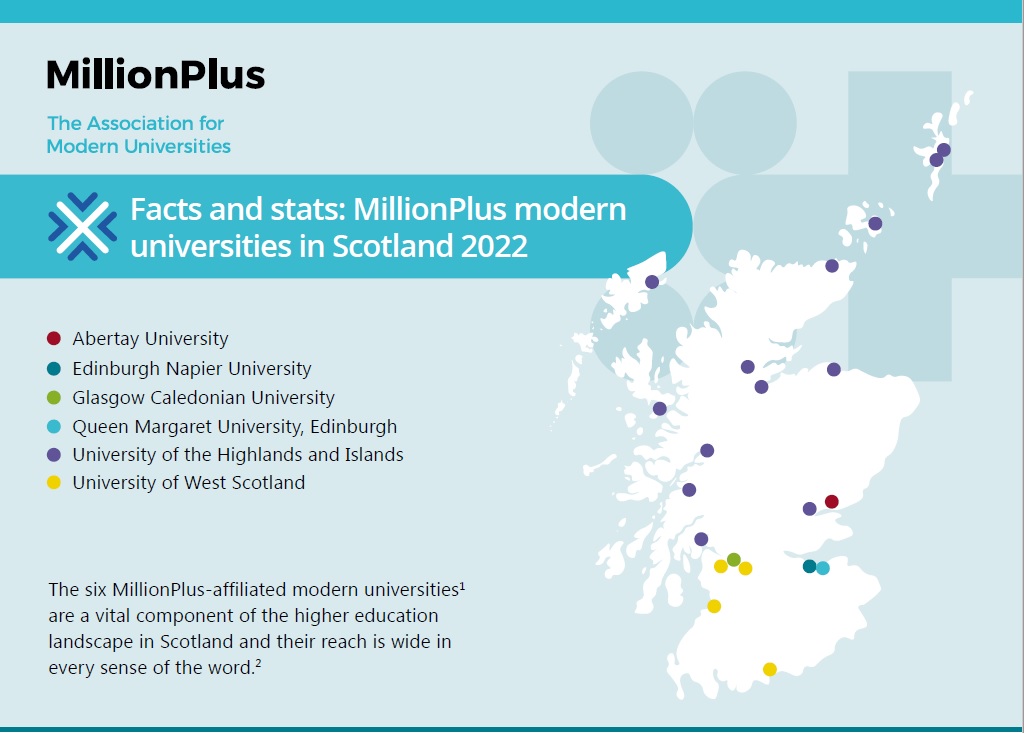

Response
22 Jun 2022
MillionPlus response to Scottish Government Innovation Strategy - call for evidence
The Scottish Government launched a Call for Evidence seeking views to inform the development of the forthcoming Innovation Strategy. The purpose of this strategy is to develop a ten-year vision to transform Scotland’s innovation ecosystem in order to ensure that Scotland’s businesses, people and institutions are ready to meet the global economic challenges and opportunities the country will face.


Case study
27 May 2022
Placemakers: Cyan Forensics, Edinburgh Napier University
Cyan Forensics is based on research by an Edinburgh Napier University team overseen by Professor Bill Buchanan, the third cyber security-related spinout from this award-winning research team.

Case study
27 May 2022
The cyberQuarter is a new £18m cybersecurity research and development centre housed within Abertay University that aims to make Dundee Scotland’s capital for the cybersecurity industry.

Case study
27 May 2022
Placemakers: Novosound – a spinout company from the University of the West of Scotland (UWS)
Novosound is an award-winning company that has developed and patented a groundbreaking technique to mass-manufacture printable ultrasound sensors.

Case study
27 May 2022
Placemakers: Nurturing future talent through placements at Solent University
Enterprise Rent-A-Car partners with Solent University to deliver impactful placements which help to break down barriers, enabling individual and organisational growth through a graduate recruitment programme.

Case study
26 May 2022
Placemakers: The University of East London’s Royal Docks Centre for Sustainability
With investment from, and the support of, the Royal Docks and Newham Borough Council, the University of East London (UEL) is taking its no longer fit-for-purpose Knowledge Dock building located at the heart of its Docklands campus and bringing it back to life as the Royal Docks Centre for Sustainability.



Case study
25 May 2022
Placemakers: Smiles all round for UCLan school of dentistry
When the University of Central Lancashire's (UCLan) School of Dentistry opened its doors 10 years ago, it was one of only two new dental schools to be created in England for over 100 years. Since then, UCLan dental students have treated more than 23,000 patients during their training and the school has produced hundreds of new dentists who have expanded the region’s dental workforce considerably.

Case study
23 May 2022
Placemakers: Faculty of Health and Wellbeing at the University of Sunderland
The University of Sunderland has grown and invested in health-related disciplines, working in partnership with South Tyneside and Sunderland NHS Trust, the GP Alliance and local charities to respond to the Skills shortage for healthcare professionals facing the region.

Report
23 May 2022
Research Report: Staying local to go far: modern universities as placemakers
This report explores both the regional economic contribution of institutional expenditure associated with modern universities to the local and wider economies; and the social impact of modern universities in regions across the UK.






Case study
23 May 2022
Placemakers: Designing the country’s first ever Year 14 at London South Bank University (LSBU)
Around a dozen students at South Bank University Technical College (UTC) were unable to take their places on engineering apprenticeships at the start of the 2019-20 academic year, due to their prospective employers instigating hiring freezes in response to the impact of coronavirus. Faced with the challenge of these pupils finishing school in the height of a pandemic, the UTC collaborated with other members of LSBU Group to find a solution.




Case study
11 May 2022
Placemakers: Stimulating economic regeneration at University of Wolverhampton's Springfield Campus
The £120m Springfield Campus seeks to stimulate economic regeneration in Wolverhampton and the Black Country by bringing together school-level education, employer training provision and higher education on one site. Situated on a former brewery site, Springfield has transformed a derelict area of the city.










Policy Briefing
17 Nov 2021
Supply and demand – why high quality placements are critical to the future of ITE
High quality and plentiful placement opportunities across the entire country is the ambition of the entire sector. Unlocking this capacity will do more to make a material different to ITE than any review or marketing campaign.
Alongside strengthening England’s ability to recruit and retain teachers, the work that can be accomplished through effective partnerships across every region of the country can unlock the many additional benefits highlighted in this report.


Policy Briefing
01 Oct 2021
Levelling up to £22 billion: research, innovation & local business support
Increasing expenditure in R&D is a critical means by which the government can support recovery from the pandemic and its ambition to level up the country.
It is crucial that by increasing the level of spend on research and innovation, the government ensures that investment is spread across the country to support effective recovery and help reduce regional inequalities.
Report
01 Oct 2021
Innovate and generate: modern universities supporting local businesses
Local business partnerships are very much at the heart of what modern universities do. Indeed, they have always been a vital component in which these institutions engage with their surroundings and contribute towards their local economy.
The case studies featured demonstrate the innovation, investment and economic impact generated through these partnerships.







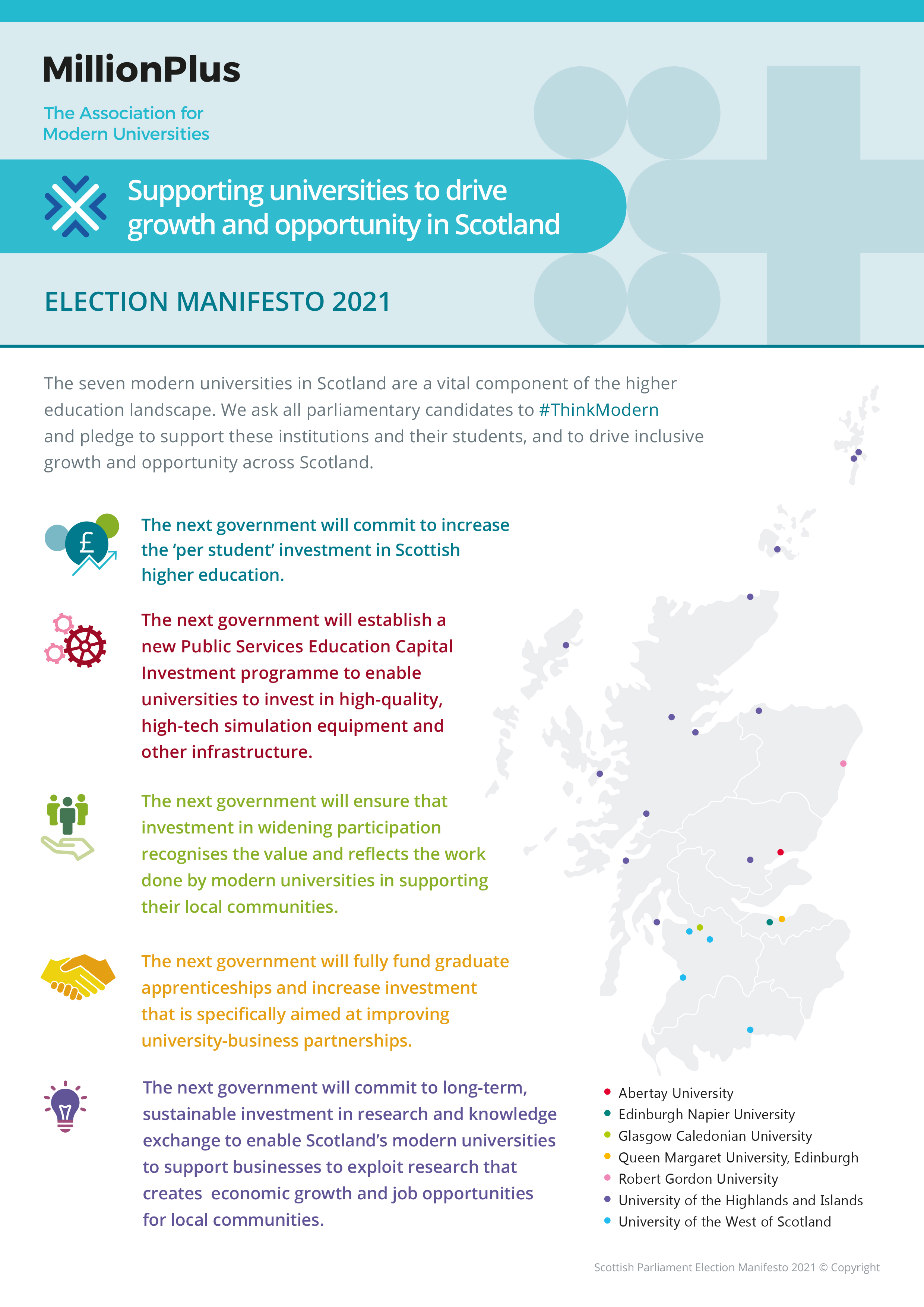





Report
05 Jan 2021
ITT Core Content Framework Exemplar Resource – 2021 Update
The ITT Core Content Framework (CCF) was published in 2019 and it defines the minimum entitlement for all trainees, placing a duty on ITT providers and partner schools to work to embed this in programmes from the start of term in September 2020. This updated exemplar document was designed to aid providers and it includes resources that complement those in the references section of the CCF. It has been designed and updated by sector experts, including MillionPlus members. Although the document is not a comprehensive guide to embedding the CCF, it will hopefully prove to be a helpful collection of suggestions and ideas that providers will find useful when tackling specific challenges, or indeed opportunities, as they ensure that the CCF is fully implemented within their provision.
Report
17 Dec 2020
ITT setting/school placements 2020/21: provider approaches and work in progress
This toolkit has been developed by the sector, for the sector, and is intended to act as a helpful guide for ITT providers. It sets out ways in which providers are approaching setting/school placements in the current COVID-19 context. It builds on the earlier placement paper published in July 2020, by providing additional ideas and approaches. The toolkit itself was created through discussion between sector representative bodies (UCET, NASBTT, MillionPlus) and collates examples of practice from the sector.

Case study
24 Nov 2020
UCLan: Urgent action needed to protect firefighters from risk of getting cancer, scientists find
University of Central Lancashire report makes urgent recommendations to minimise firefighters’ exposure to toxic fire effluents

Case study
24 Nov 2020
Responding to the pandemic – insights from an infection prevention and control graduate
Sofie French, a senior infection prevention and control nurse who graduated from the University of the Highlands and Islands' infection prevention and control MSc in 2018, talks about responding to the COVID-19 pandemic






Policy Briefing
29 Jul 2020
The future of Initial Teacher Education: Living in the age of Covid-19 and beyond
The coronavirus pandemic has thrown education providers across the globe into crisis. In the UK, alongside the NHS, the education sector has been at the forefront of the fight against the impact of the virus over the last few months and we believe that education is also the answer to the UK’s post-Covid-19 recovery and renewal.
The initial teacher education (ITE) sector has responded positively to the challenges posed by the pandemic both at its height and as the UK eases out of national lockdown. These successes have only been possible through collaboration at every level, both local and national. This spirit of co-operation can be developed as the UK moves from a state of emergency to a time of emergence while maintaining a robust, high-quality and successful ITE system. It is with this aim that we publish this joint briefing

Parliamentary Briefing
29 Jul 2020
MillionPlus leads cross-sector call for a national recovery plan in Initial Teacher Education
Amid the ongoing Covid-19 crisis, MillionPlus, the Association for Modern Universities, and the National Association of School-Based Teacher Trainers (NASBTT) have today come together to call on the Department for Education to convene a sector-wide advisory group to formulate a national Initial Teaching Education recovery response.


Policy Briefing
07 May 2020
International student recruitment in the age of Covid-19
Modern universities welcome hundreds of thousands of EU and international students onto their campuses each year, and these students contribute hugely to the academic, social and economic life of the university and its local area.
There was already a number of significant changes due to affect students from overseas, specifically, the introduction of the new immigration system and the ending of the transitional phase of the UK withdrawal from the EU. However, with the COVID-19 pandemic limiting international travel and putting much economic activity on hold, there are now more immediate concerns and the enormous value of these students to our society and economy has been put into even sharper focus.

Report
28 Apr 2020
Strengthening and enhancing UK public services in response to Covid-19
This paper sets out proposals that flesh out and elaborate Achieving stability in the higher education sector, the Universities UK plan published on 10 April 2020. Section C.i of the plan proposed “targeted support to protect and sustain courses that meet the national need for key workers” in public services and facilitate planned growth in 2020-21 and 2021-22 in areas such as nursing, healthcare, medicine, teaching and social work.
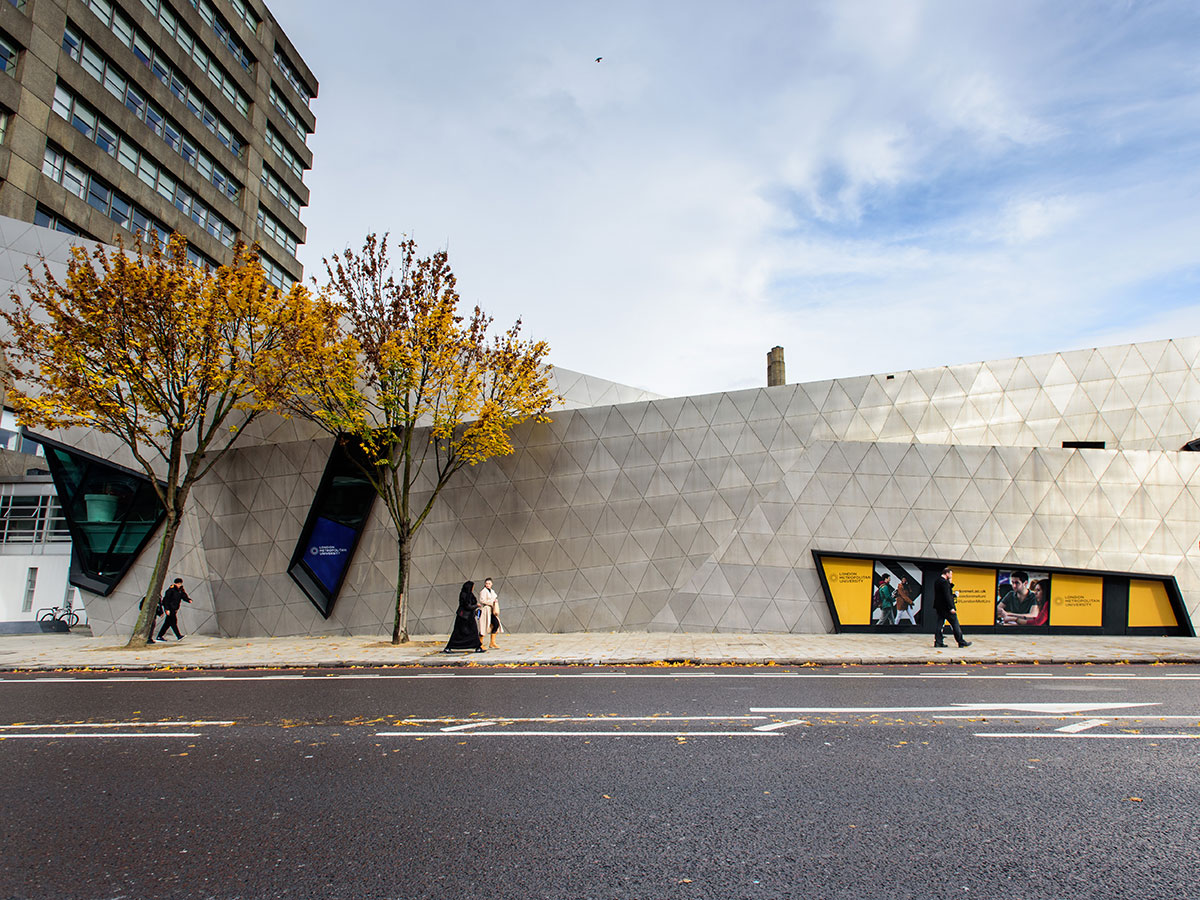
Case study
25 Feb 2020
SPF2020: London Metropolitan University - The Accelerator
Since its inception in 2003, the Accelerator has helped thousands of tech startups and London Metropolitan University students and graduates

Case study
25 Feb 2020
SPF2020: University of East London - The Eastern New Energy project
An ERDF-funded initiative, The Eastern New Energy project will address market failures enabling regional SMEs to grow and become more competitive

Case study
25 Feb 2020
SPF2020: University of Cumbria - Eco-innovation Cumbria
An ERDF-funded project, in partnership with the University of Central Lancashire and Lancaster University, Eco-innovation Cumbria is a four-year project designed to help Cumbrian SMEs.

Case study
25 Feb 2020
SPF2020: University of Wolverhampton - Brownfield Research and Innovation Centre
An ERDF-funded project to establish a centre of excellence in brownfield research and innovation supporting the regeneration of the Black Country

Case study
25 Feb 2020
SPF2020: University of Sunderland - Internships and Enterprise Projects
An ERDF-funded project that places graduates into SMEs and supports student and graduate entrepreneurs to develop their business ideas









Case study
26 Apr 2019
Wearable technology will monitor respiratory rate among new-born babies
An innovative wearable sensor to monitor new-born babies in poor areas is being developed by Anglia Ruskin University, in collaboration with experts in Jordan.

Response
23 Apr 2019
QAA consultation on fees charged for its work as the designated body for England
Policy Briefing
10 Apr 2019
Overview of the Recruitment and Retention Strategy and Early Career Framework
The Department for Education (DfE) published its Recruitment and Retention Strategy document in January 2019. This document establishes a framework that unites the two pressing issues of teacher recruitment and teacher retention under a single approach. The strategy aims to help answer the following two questions from a national perspective:
• How can we best promote teaching as a profession and ensure enough people are recruited?
• How can we minimise the number of teachers leaving the profession in the early years of their career?
Here MillionPlus and UCET present an overview of the strategy and its contents.

Policy Briefing
13 Mar 2019
A new system for student visas
The current student visa system (Tier 4) does not currently deliver for the UK: it is unduly subjective, inequitable, and can act as a non-tariff barrier to trade in educational exports. With the government's target of achieving £30bn in education exports by 2020, MillionPlus believes this can only be achieved through a sector-wide strategy for growth, with a range of reforms to international student recruitment. This policy briefing lays out the arguement for change to the Tier 4 student visa process and proposes two ways of reforming the system to meet the objectives of the government and the universities in the years ahead.






Policy Briefing
26 Jul 2018
EU students studying in the UK bring to the country enormous cultural, academic and economic benefit. The importance of these students to universities and their fellow students is significant, with many courses at both undergraduate and post-graduate level supported by students from the EU. Equally important is the impact on the regions they study in, meaning that every part of the UK benefits from their presence.







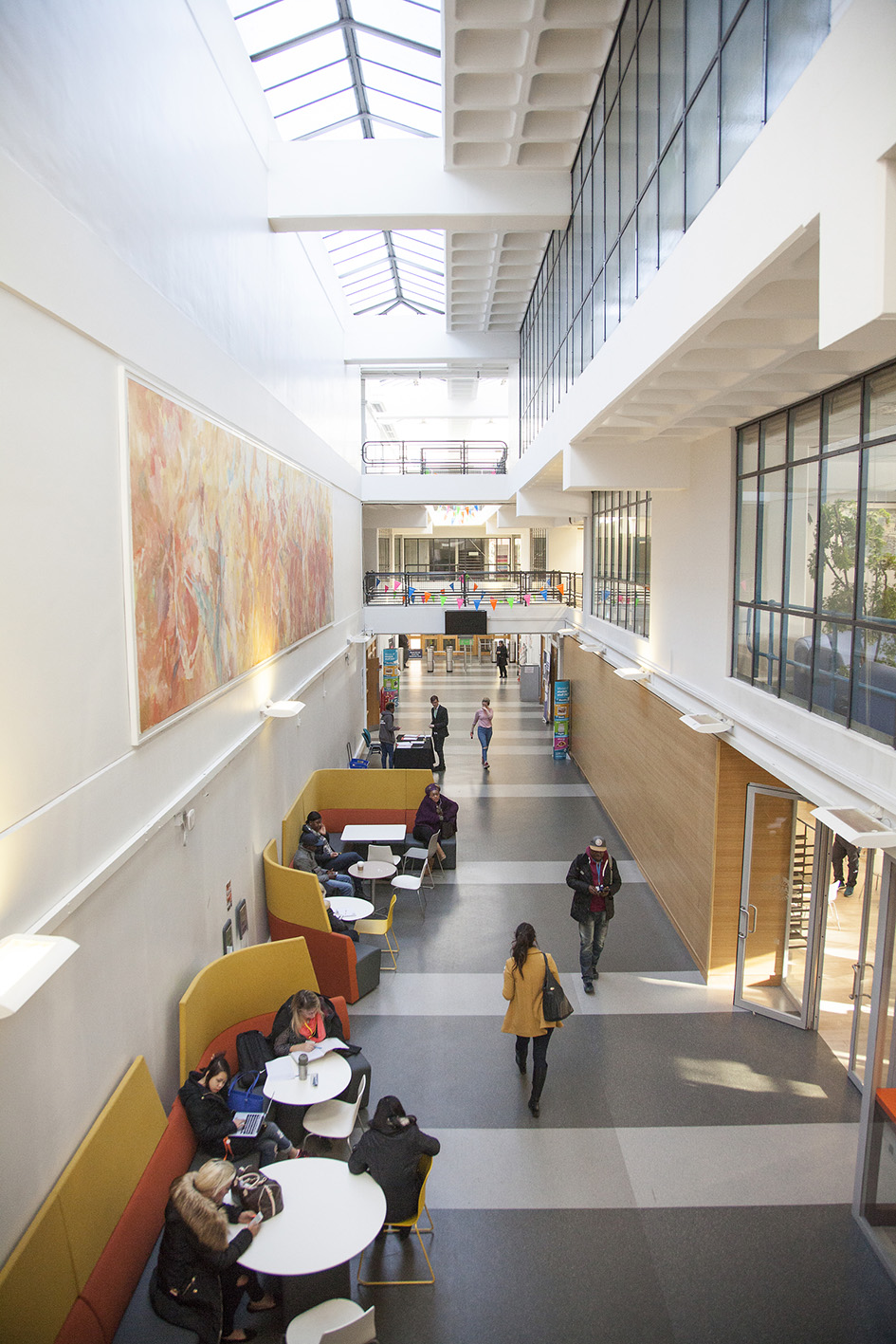



Case study
23 Mar 2018
Staffordshire set to get smart through digital innovation partnership
An emerging partnership between Staffordshire University and Staffordshire County Council is set to improve lives and productivity through cutting-edge technology.
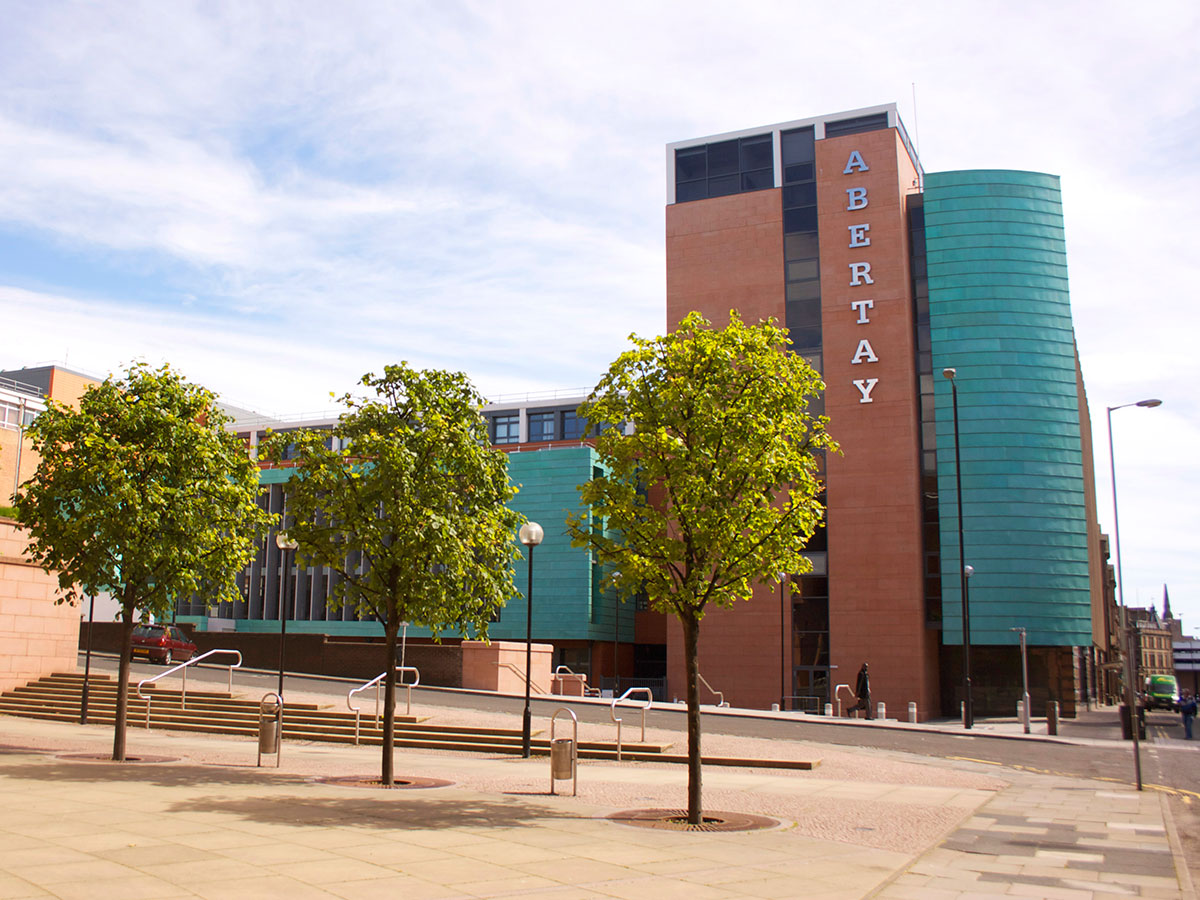












Policy Briefing
13 Dec 2017
Student grants, social mobility and the case against differential fees
All students deserve to study at well-funded universities, wherever, whatever and however (full or part-time) they choose to study. This briefing explains why the government would be wrong to introduce differential fees and why it would be right to restore student maintenance grants.


Case study
29 Nov 2017
The University of East London unveils new state-of-the-art clinical simulation centre
The University of East London has unveiled a new state-of-the-art clinical simulation centre at a reception marking the official launch of its new adult nursing degree.

Case study
22 Nov 2017
The University of the West of Scotland and The Alliance have established a strategic partnership agreement

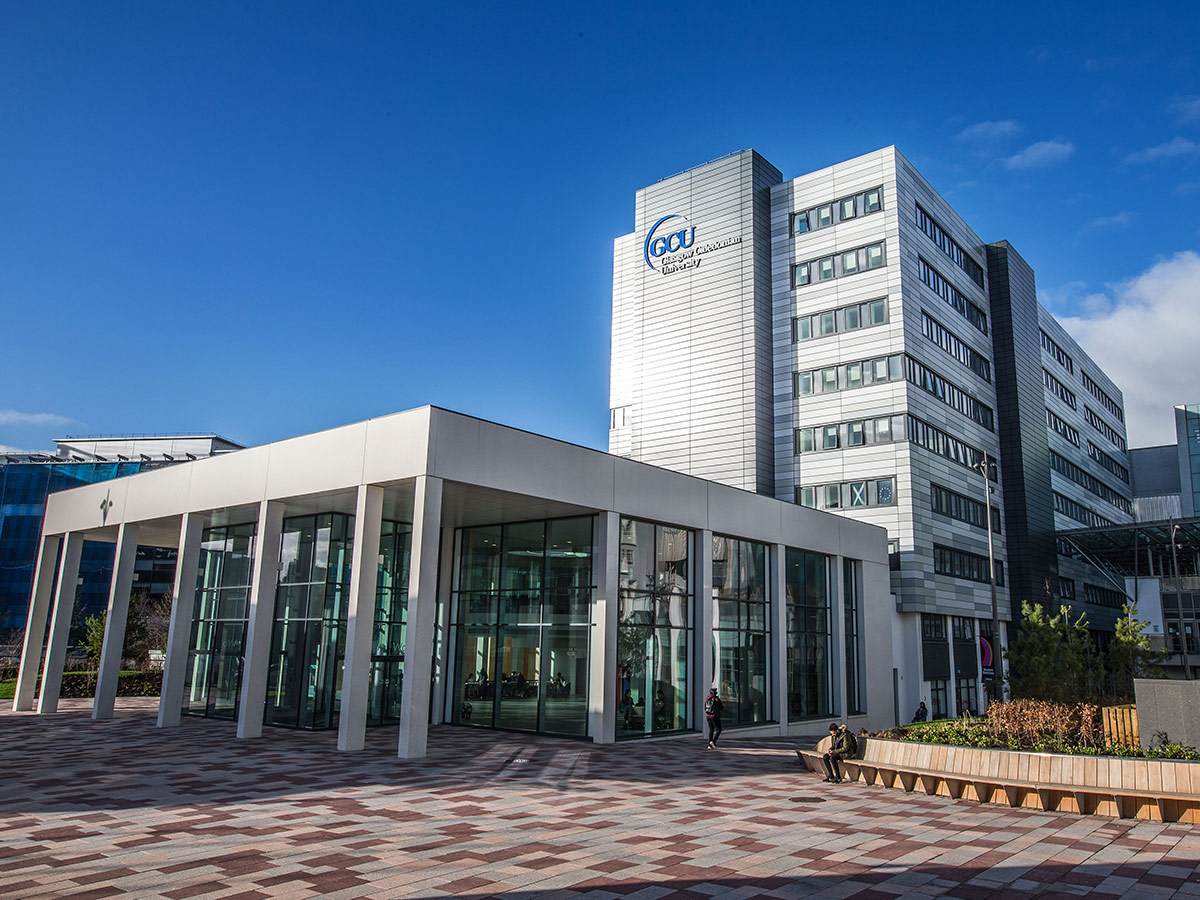
Case study
01 Nov 2017
A Glasgow Caledonian University research team has contributed to World Health Organization (WHO) guidelines on infection control and prevention to help minimise the spread of infection

Case study
19 Oct 2017
New research centre at Anglia Ruskin to support Armed Forces Community
A new facility based at Anglia Ruskin University will allow easy access to global research on veterans and their families



Case study
28 Sep 2017
Diabulimia issues uncovered by research at Abertay University
New Scottish research into the experiences of young people with diabetes has cast fresh light on the potentially fatal condition of Diabulimia, suggesting it is “common” for young diabetic women to shun their insulin in a bid to lose weight.
Initial findings from an Abertay University counselling project looking specifically at issues for young people with type 1 diabetes has pinpointed a need for greater emotional support for those struggling to cope.


Policy Briefing
13 Sep 2017
Brexit – what’s best for our universities and students?
MillionPlus, the Association for Modern Universities, believes that it is crucial that the needs of the UK’s higher education sector are fully considered during the Brexit negotiations. This briefing highlights the key issues and outlines what the best deal for Brexit would look like to ensure that the interests, income, collaborations and reputation of the UK’s higher education sector are sustained during the negotiations and beyond.


Report
12 May 2017
A manifesto for health education
This manifesto sets out the steps that we believe the next government should take to avoid future staff shortages, improve health outcomes and move to the greater integration of health and social care as well as support the NHS and social care workforce of the future.

Report
10 May 2017
A manifesto for teacher education
Modern universities have a long history of delivering high quality teacher education. This manifesto sets out the steps that we believe the next government should take to improve teacher education and professional development in England and retain high quality teachers in the profession.




Parliamentary Briefing
24 Apr 2017
Higher Education and Research Bill: Consideration of Lords Amendments




Case study
30 Mar 2017
Creating global communities: MARTHA final report presented at IMO
The three-year MARTHA project has been co-ordinated by researchers at Warsash Maritime Academy, part of Southampton Solent University and partners from Sweden, Denmark, China and the UK.

Case study
30 Mar 2017
Creating global communities: Graphic design summer school
Last summer the Southampton Solent University International Development team welcomed staff and students from Shanghai Institute of Technology, to take part in a two week international graphic design summer school

Case study
30 Mar 2017
Delivering expertise in enterprise and innovation: UK business opportunities post-Brexit
In November 2016, Southampton Solent University's School of Business, Law and Communications hosted its third Annual Business Conference

Case study
30 Mar 2017
Changing lives: Professor Pigment
Graphic Design graduate Andy Evans didn’t just use his Staffordshire University experience to transform his own life – he also used his talent and ambition to celebrate a city and pay back his parents.

Case study
30 Mar 2017
Developing new professions for new businesses: degree apprenticeships for police officers
Staffordshire University is joining forces with other modern universities on the creation of new degree apprenticeships for police officers.


Case study
30 Mar 2017
Delivering expertise in enterprise and innovation: Lighting the fuse
May 2016 saw the start of a major action research project designed in the North East of England and delivered by the region’s five universities with the University of Sunderland taking an active role

Case study
30 Mar 2017
Developing new professions for new businesses: Software City
Since 2008, Sunderland Software City has supported the growth of over 400 software companies in the North East of England. The University of Sunderland was the leading founding partner in the pioneering initiative when it was set up and continues to play an active role in its delivery.

Case study
30 Mar 2017
Developing new professions for new businesses: the National Glass Centre
The University of Sunderland’s leadership of the National Glass Centre, the Northern Gallery for Contemporary Art and The Cultural Spring has been recognised by leading figures from Arts Council England, the V&A and Heritage Lottery

Case study
30 Mar 2017
Changing lives: A Cultural Spring
In mid-2012, a consortium of organisations led by the University of Sunderland came together to create a ten-year vision to radically change the way that local people consume, experience, influence and make excellent art.

Case study
29 Mar 2017
Creating global communities: East London to Langa
The women and men of the University of East London’s Hockey Club enjoyed a once-in-a-lifetime opportunity last year to travel to South Africa to coach school children in the township of Langa, near Cape Town.

Case study
29 Mar 2017
Delivering expertise in enterprise and innovation: Firing the start-up gun
Precision Sports Technology is just one of many exciting start-ups to emerge from the University of East London over the past two decades

Case study
29 Mar 2017
Developing new professions for new businesses: Waging the cyber-security war
A University of East London postgraduate programme is helping fight back against the threats of the digital world

Case study
29 Mar 2017
Changing lives: Firoz Patel and Childreach International
Firoz Patel's life was changed by studying for his International Development degree at University of East London.

Case study
27 Mar 2017
Changing lives: Dyslexia is no barrier
Third year business management student Anthony Abbott has come a long way since joining Southampton Solent University in 2014, taking advantage of regular one-to-one academic support to manage his dyslexia and improve his report writing skills.

Case study
27 Mar 2017
Creating global communities: Turning the tide on marine litter
Led by the Environmental Research Institute at North Highland College UHI (part of the University of the Highlands and Islands), the Circular Ocean project aims to tackle the increasing problem of marine pollution by encouraging the upcycling and repurposing of plastic litter.

Case study
27 Mar 2017
Developing new professions for new businesses: The superyacht revolution
The explosion of demand for dedicated superyacht crew led Southampton Solent University to create Warsash Superyacht Academy in 2012, and the ever-increasing size of modern yachts has merited the creation of a new unlimited superyacht cadetship.

Case study
27 Mar 2017
Changing lives: student wins social care award
A University of the Highlands and Islands student from Mallaig has been named as the first ever recipient of an award recognising the skills and qualities valued in integrated health and social care.

Case study
27 Mar 2017
Delivering expertise in enterprise and innovation: A fine Highland vintage
Since 2002, the Agronomy Institute at Orkney College UHI (part of the University of the Highlands and Islands) has been working to diversify the range of locally-grown fruits available to northern food and drink companies by testing several novel species.

Case study
27 Mar 2017
Developing new professions for new businesses: Inverness and Highland City-Region Deal
The University of the Highlands and Islands has been awarded £9m from the UK Government, as part of the Inverness and Highland city-region deal to establish commercialisation, academic and clinical capacity to deliver projects in health, social care and life sciences.

Case study
24 Mar 2017
Changing lives: Reducing amputations in people with diabetes
Working with clinical colleagues in NHS Highland and local industry partner Tactical Wireless, University of the Highalnds and Islands' rural health and wellbeing team has helped to establish a collaboration which is developing a new care pathway for people living with diabetes complicated by foot ulceration

Case study
24 Mar 2017
Creating global communities: UWS visits UW-P
University of the West of Scotland colleagues and students engaged in a week-long overseas exchange with the University of Wisconsin Platteville (UW-P) in the US.

Case study
24 Mar 2017
Creating global communities: Charlie and the check-in functionality
A commercial partnership between University of the West of Scotland and Chinese technology firm, Wuxi Chigoo Interactive Technology, has resulted in a UWS student developing a new method to improve journey experiences for airport visitors.

Case study
24 Mar 2017
Delivering expertise in enterprise and innovation: Rock solid foundations
Marta Zurakowska, a recent PhD graduate of the University of the West of Scotland has launched her company UK Stone Doctor Ltd with support from the University’s Enterprise Services.

Case study
23 Mar 2017
Delivering expertise in enterprise and innovation: Nanokicking stem cells into action
Our bodies’ stem cells have a great potential to turn into other kinds of tissue such as blood, muscle or bone, but sometimes they need a little encouragement. Now a collaboration between the University of the West of Scotland and the University of Glasgow has developed a novel way of nudging the cells where we want them - and turning them into bone.

Case study
23 Mar 2017
Delivering expertise in enterprise and innovation: new horizons in astronomy
The University of the West of Scotland is part of a collaboration which received the 2016 Special Breakthrough Prize in Fundamental Physics which was presented at an event last December in Mountain View, California.

Case study
23 Mar 2017
Developing new professions for new businesses: Funding for new Graduate Apprenticeships
The University of the West of Scotland has been awarded funding of over £2m from Skills Development Scotland to design and deliver Graduate Level Apprenticeship programmes in Software Development and Engineering: Design and Manufacturing.

Case study
23 Mar 2017
Changing lives: The 'Wee University' initiative
Shirley-Anne Somerville MSP, Minister for Further Education, Higher Education and Science, officially launched University of the West of Scotland’s new ‘Wee University’ initiative at its Ayr Campus in February 2017.

Case study
23 Mar 2017
Delivering expertise in enterprise and innovation: The Mountain Bike Centre for Scotland
Edinburgh Napier University collaborates with industry at The Mountain Bike Centre for Scotland; supporting a multi-million pound economic boom as businesses create new and innovative products for the soaring number of cyclists taking to the great outdoors.

Case study
23 Mar 2017
Changing lives: Award-winning achievement
University of the West of Scotland Digital Art and Design student Michael Mabon recently won the Alex Richardson Achiever of the Year Award to recognise his outstanding personal achievements after brain injury.

Case study
22 Mar 2017
Creating Global Communities: Dual Translation Theatre
Jonathan Banatvala is Course Director for the Theatre Practice at London South Bank University. He is also the Artistic Director of Moving Theatre one of the UK's foremost independent producers of international collaborative work and was described by the European Cultural Foundation as the "UK's leading exponent of bilingual theatre".

Case study
22 Mar 2017
Delivering Expertise in Enterprise and Innovation: Robotic Innovation
Tackling real world challenges is at the heart of the Centre of Excellence launched by London South Bank University and The Welding Institute (TWI) in 2015. The Centre is developing autonomous robotic systems that can carry out inspections with little or no human involvement.



Case study
21 Mar 2017
Delivering expertise in enterprise and innovation: Sustainability study for small breweries
Researchers from Southampton Solent University are working with brewers, pubs, and others in the beer industry, to investigate opportunities for circular economy transitions, ensuring economic and environmental sustainability in the UK craft brewing industry.

Case study
21 Mar 2017
Changing lives: STEM takes root
Female school pupils from throughout Renfrewshire got the chance to discover more about Science, Technology, Engineering and Mathematics (STEM) subjects at an event at the University of the West of Scotland in Summer 2016.



Case study
21 Mar 2017
Delivering expertise in enterprise and innovation: The fast lane for Motorsport Engineering
Autumn 2017 heralds the launch of the National Centre for Motorsport Engineering at The University of Bolton and a unique partnership with Keating Supercars. The Centre will allow the students to be both industry immersed and technically superb enabling them to become distinctive and outstanding innovators through exceptional quality teaching and learning informed by research.


Case study
21 Mar 2017
Creating global communities: Engineering a united world
In October 2016 The University of Bolton announced that the Institution of Civil Engineers (ICE) had launched its first UAE Student Chapter at its Academic Centre in Ras Al Khaimah and is the first ICE Student Chapter in the Middle East.

Case study
21 Mar 2017
Developing new professions for new businesses: Bringing the Sparkle to dental science
The University of Bolton has joined forces with Sparkle Dental Labs to be part of a sector-leading learning environment for dental sciences students that will bring new jobs to Bolton.

Case study
21 Mar 2017
Creating global communities: Go Global Initiative
As economic, innovation, business and cultural networks stretch across the whole globe, opportunities for students to spend time abroad as part of their studies are more important than they have ever been. The University of Bedfordshire's Go Global initiative was designed to address these barriers, expanding access to mobility and broadening the horizons of their students, some of whom had never left the UK.

Case study
21 Mar 2017
Delivering expertise in enterprise and innovation: Bath & Bristol by Design
Bath Spa University is part of a £750,000 research project examining the use of design in businesses and public sector organisations in Bath and Bristol.

Case study
20 Mar 2017
Middlesex University London’s newest addition to its north London campus is more than just an innovative and modern building with green credentials. The Ritterman Building – named after the university’s esteemed Chancellor, Dame Janet Ritterman – is also home to the UK’s first Cyber Factory training facility.

Case study
20 Mar 2017
Developing new professions for new businesses: Trailblazing Degree Apprenticeships
London South Bank University is one of the institutions leading the field in designing and delivering Degree Apprenticeships.

Case study
20 Mar 2017
Developing new professions for new business: #ThisGirlCodes
Bath Spa University launched #ThisGirlCodes, a campaign to get more young women to enter the tech industry.


Case study
09 Mar 2017
Creating global communities: Global Academy of Liberal Arts (GALA)
GALA was founded by Professor Christina Slade, Vice-Chancellor of Bath Spa University in 2014 to bring together Liberal Arts providers from around the world.




Case study
02 Mar 2017
Devolution jigsaw: Supporting the heartland of ceramics - Staffordshire University


Report
02 Mar 2017
Universities, devolution and the industrial strategy: piecing the jigsaw together
Modern universities have long made significant contributions to their communities. Through collaborations with business and industry, public services and local government, as employers and major organisations, they are key drivers of economic activity, innovation, social mobility and community cohesion. As set out in this report, devolution has been a series of initiatives which have proceeded at different paces with varying levels of stakeholder buy-in and, arguably, an inconsistent policy framework. As a result, devolution in England is more akin to a patchwork quilt, albeit with large areas of the country excluded, that has yet to be fitted into a coherent pattern.

Response
06 Feb 2017
MillionPlus response to the consultation on OfS registration fees and other fees







Parliamentary Briefing
16 Nov 2016
Westminster Hall Debate: Immigration Rules for International Students




Policy Briefing
11 Oct 2016
Policy briefing: Trade in HE services and research - negotiating Brexit
UK universities have forged extremely successful and beneficial relationships with the European Union (EU). In terms of research funding. Additionally, the trading relationships established through the UK’s membership of the European Union mean that the UK has been able to export education without any tariff barriers to a market of over 500 million people. The primary target of these exports are EU students who study at UK universities.
This policy briefing reviews information published by Universities UK and data collected by the Higher Education Statistics Authority (HESA) to analyse the value of the UK’s EU educational export market to the UK economy. It also identifies the impact of this trading relationship in each devolved administration of the UK and in each English region.

Policy Briefing
08 Sep 2016
Political parties throughout the UK have long agreed that research and innovation are key drivers of economic growth and smart innovation. Universities are at the heart of delivering this agenda, showing particular strength in the quality and impact of their research.
As the new analysis in this briefing illustrates, concentration of research funding in a small number of universities in England is an issue not just nationally but also regionally. Across the country, three institutions receive 25% of the funding, and in most regions in England the modern universities that make up around 50% of the sector receive less than 10% of the quality-related research funding for that region.

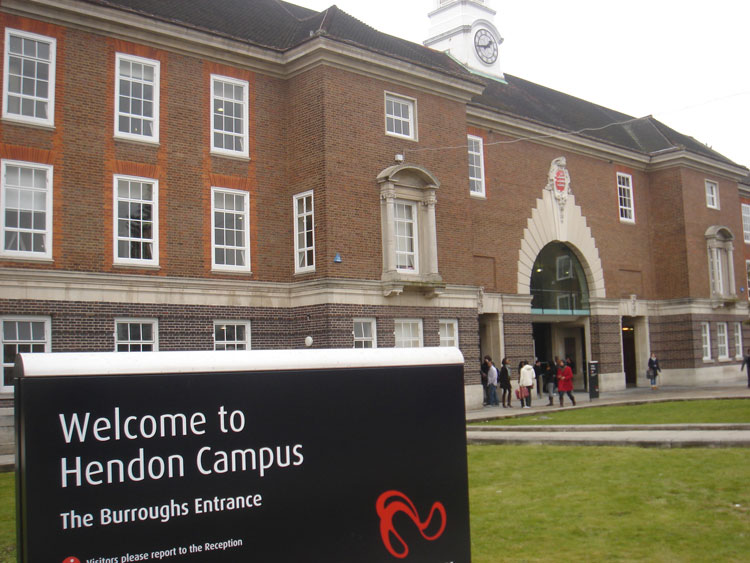











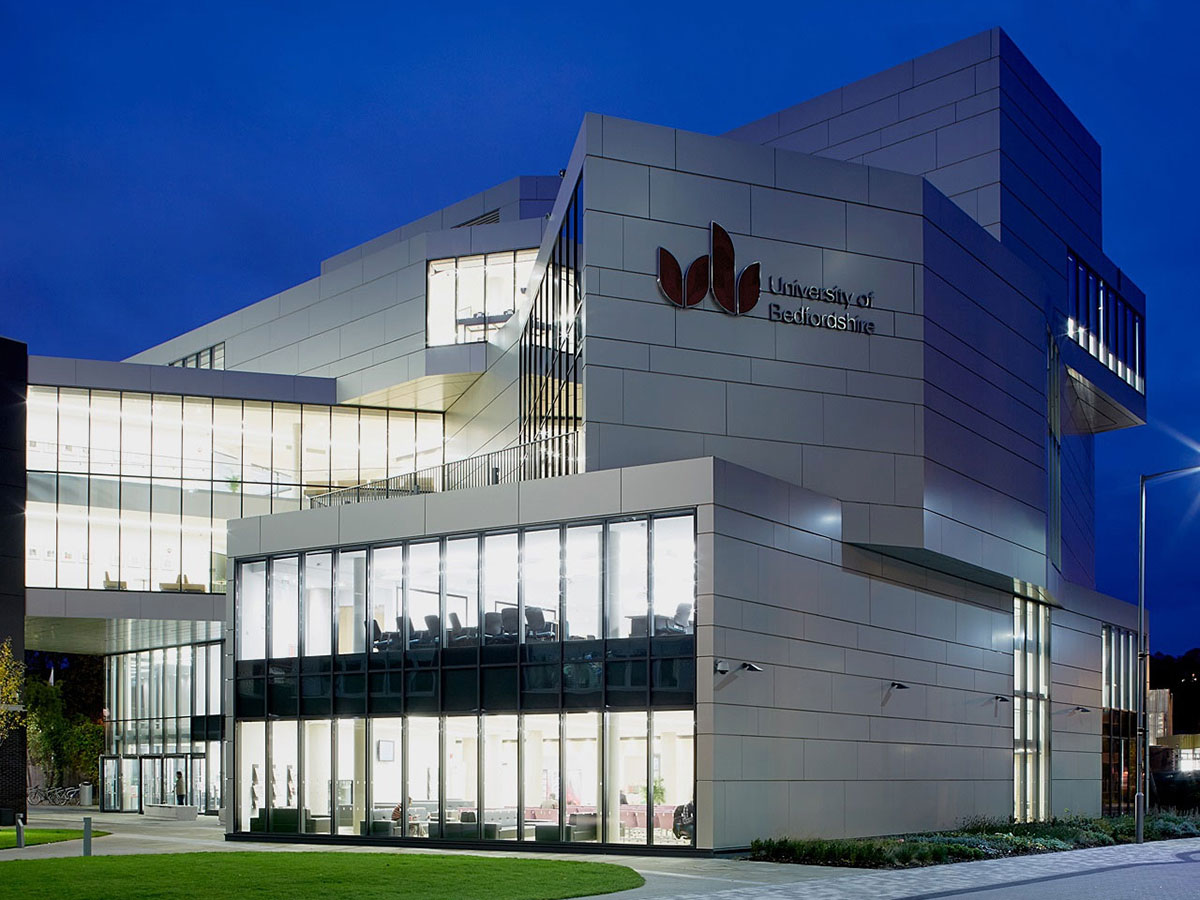














Case study
21 Apr 2016
Changing the face of neonatal care in Vietnam - Canterbury Christ Church University



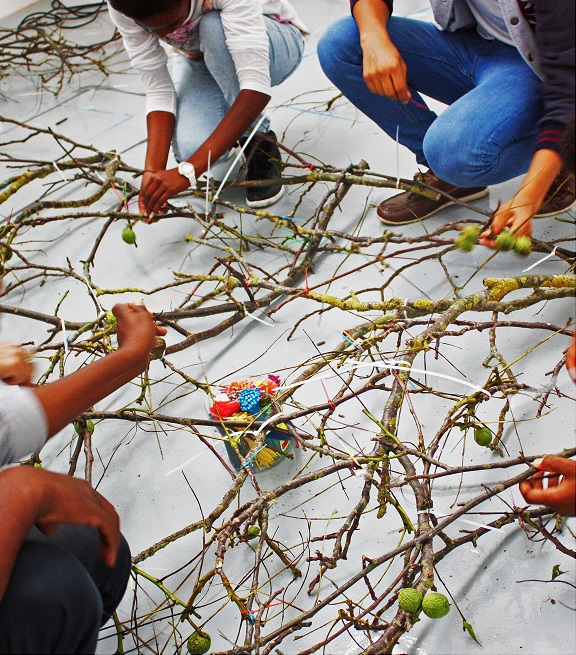










Report
23 Nov 2015
Creative Futures - Ten steps to support the creative economy
This report highlights the success of the creative industries in supporting the wider creative economy and examines the role of higher education and, in particular, modern universities in underpinning this success.








Policy Briefing
24 Sep 2015
Spending Review 2015: Universities and productivity
This policy briefing concentrates on the million+ submission to the Treasury’s Spending Review. Spending Review 2015: Universities and productivity sets out a series of specific measures to ensure that universities, employers, small businesses and individuals can respond to the government’s productivity agenda.

Case study
22 Sep 2015
The GEM Project - Southampton Solent University
Led by Southampton Solent University’s China Centre (Maritime), the Gender, Empowerment and Multicultural Crews (GEM) project is examining the working conditions, attitudes and cultural behaviours on-board the worlds’ ships


Parliamentary Briefing
24 Jul 2015
Post-study work routes for international students
The Scottish Government has established a Cross Party Group to examine the case for a separate post-study work system in Scotland and the Migration Advisory Committee has published a call for evidence on minimum salary threshold for Tier 2.


Parliamentary Briefing
23 Jun 2015
Science and research in the UK and regional economies, Westminster Hall debate

Parliamentary Briefing
18 Jun 2015
Recruitment and retention of teachers, Adjournment debate 18 June 2015







Report
11 Mar 2015
A Manifesto for Health Education
This manifesto sets out a road-map and the steps which the next government must take to secure the education and training of the health and social care workforce of the future. The government must commit to a significant increase in investment in education and professional development to improve patient care, deliver innovation and the integration of services.

Report
10 Mar 2015
A Manifesto for Teacher Education
A Manifesto for Teacher Education sets out the key principles that all parties and governments should consider to ensure our schools and colleges continue to recruit qualified teachers who are experts in teaching and learning as well as subject specialisms. This manifesto also calls for the next government to put universities at the heart of the teacher education system and sets out a new plan to secure future teacher supply in England.




Parliamentary Briefing
05 Jan 2015
Higher Education Funding – House of Commons debate
This briefing considers the impact of some of the most recent reforms to higher education funding, including the changes to the tuition fee regime in 2012 and the concentration of research funding in a smaller number of universities. It also notes concerns about the RAB charge of the current system, and what this might mean for the long term sustainability of higher education funding.
No results found
- 5 per page
- 10 per page
- view all
